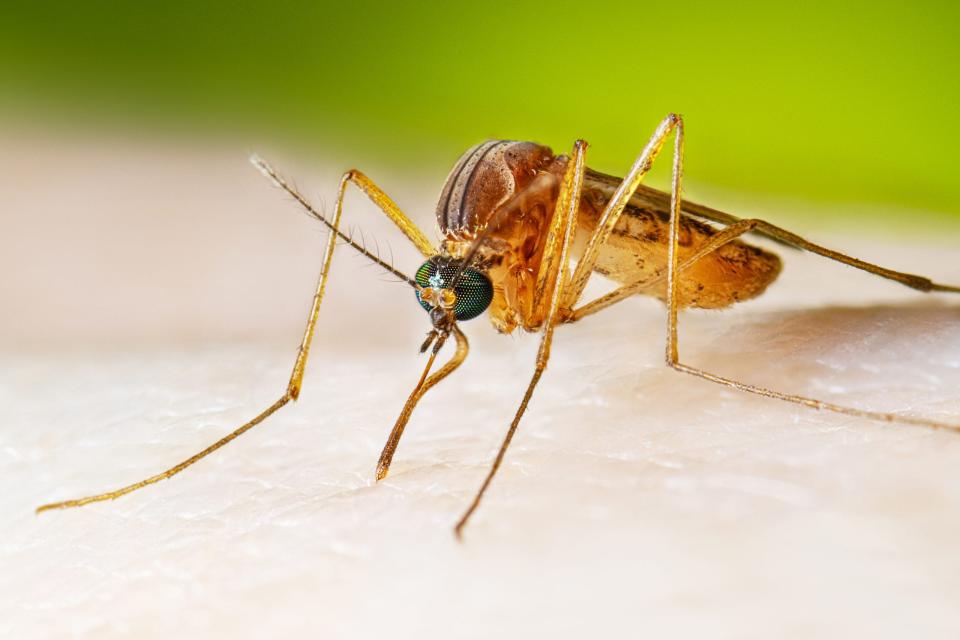Bucks County says West Nile virus may already be spreading in your town.
West Nile virus has been found in Bucks County and the county Health Department has sprayed neighborhoods in 12 municipalities where large populations of mosquitoes carrying the virus have been located.
"In each of the adult (mosquito) treatment applications that occurred this year to date, West Nile Virus (WNV) was detected...at a concentration within that population of mosquitoes that has the ability to transmit to the human population," said Ray Buckley, supervisor of the Bucks County office in Quakertown.
No cases of humans contracting the virus, which can cause serious illnesss and death, have been reported, said county spokesman Eric Nagy.

The humid, rainy weather that has hit the county this summer may be contributing to conditions that have allowed mosquito populations to multiply in wet areas and near water ponds. People are most often infected by the bite of an infected mosquito.
Several municipalities in Bucks County receive treatment
Since mid July, the health department has been spraying mosquito habitats in residential and park locations in Warrington, Falls, Bristol, Middletown, East Rockhill, Perkasie, Warminster, Middletown, Newtown, Northampton, Wrightstown and Doylestown Township, the health department announced.
"Certain mosquito species carry the West Nile virus, which can cause humans to contract West Nile encephalitis, an infection that can result in an inflammation of the brain," the health department stated in announcing the spraying in Warminster last week. "According to the Pennsylvania Department of Health, all residents in areas where virus activity has been identified are at risk of contracting West Nile encephalitis."
More: Tick-borne illness, including Lyme disease, on rise in Pennsylvania
Trucks used in the spraying are identified with Bucks County logos. Equipment on the trucks dispenses Biomist 3+15 at a rate of .75 ounces per acre. "This product is designed to provide quick, effective control of adult mosquito populations. These application materials have a very low toxicty profile to mammals and will have negligible impact to non-target insects and the environment," the county health department stated.
For most of the 20th century, West Nile Virus was usually found in Africa, West Asia and the Middle East. But in 1999, it was detected in New York City and over the next four years, spread across North America. It flares up each summer as infected mosquitoes spread the virus from birds to horses, other animals and humans, the Pennsylvania Department of Health noted.
Pa. Health Dept. says 20% of the infected develop symptoms
About 20% of the people who are infected with the virus will develop symptoms such as fever, head and body aches, nausea, vomiting and sometimes swollen lymph glands and a skin rash, the health department noted.
But one in 150 people will develop severe illness that can lead to blindness, disorientation, coma, convulsions, neck stiffness, muscle weakness, numbness, paralysis and stupor or tremors. Symptoms can last from a few days to several weeks. About one in 10 people who develop severe illness will die.
Severe illness can occur at any age but people over age 60 and those with other medical conditions are at highest risk.
"Unfortunately, no vaccine or specific antiviral treatments are available for WNV infection," the state health department said. Over the counter pain relievers may help but in severe cases, the person often needs to be hospitalized to receive supportive care.
Use EPA approved insect repellant
To avoid being bitten by mosquitoes, the state recommends using an insect repellant approved by the federal Environmental Protection Agency as well as wearing long-sleeved shirts and long pants and treating your clothing with an approved insecticide.
Also, take steps to control mosquitoes indoors and outdoors by maintaining good screens on windows and doors; regularly emptying outdoor containers, cleaning clogged gutters, and using bacterial tablets available at lawn and garden centers that will kill mosquito larvae in standing water sites while allowing the water to remain safe for people, pets and plants.
For more information about West Nile Virus, visit www.dep.pa.gov/westnile. The Bucks County Department of Health can be reached at 215-345-3318.
This article originally appeared on Bucks County Courier Times: Several Bucks County municipalities sprayed for mosquitoes

